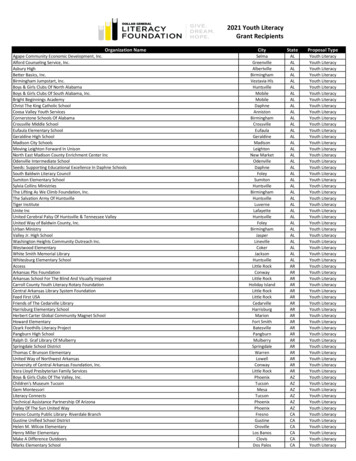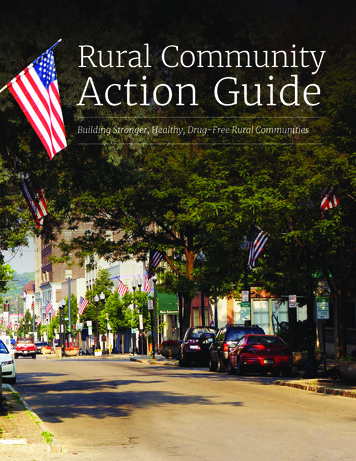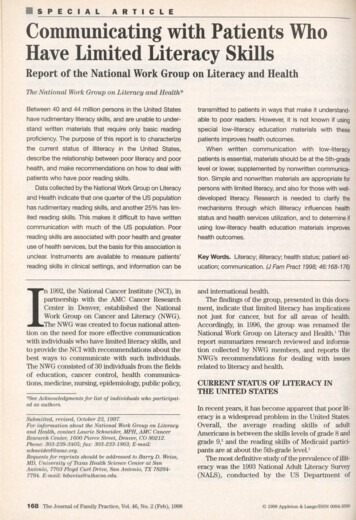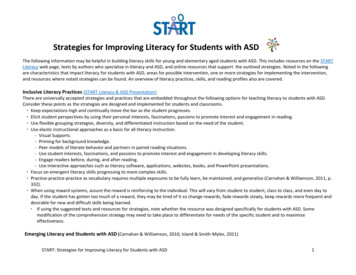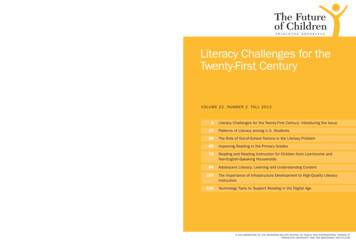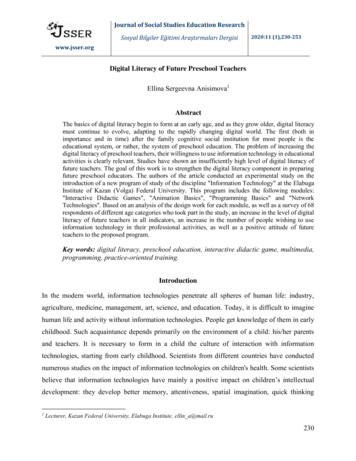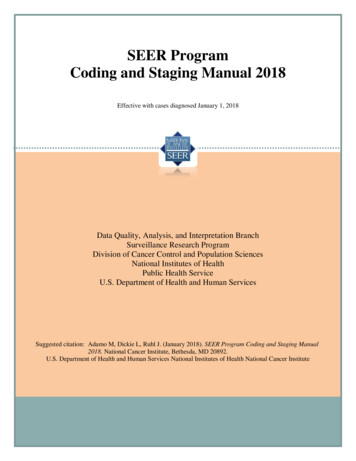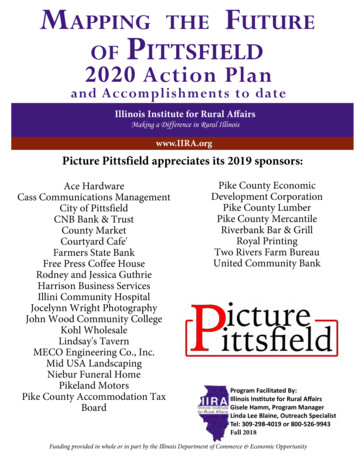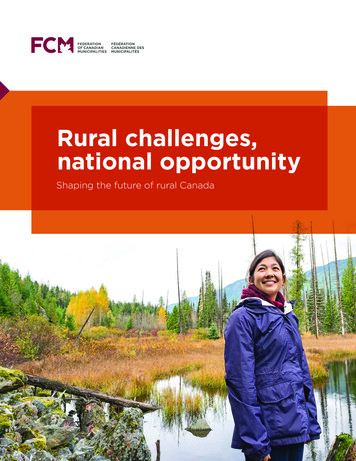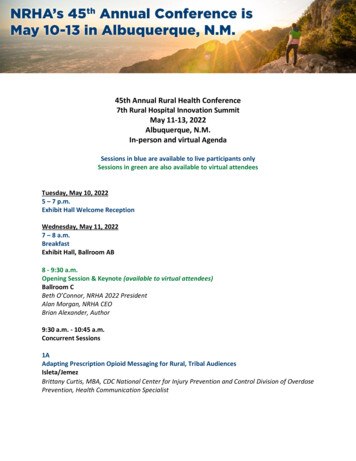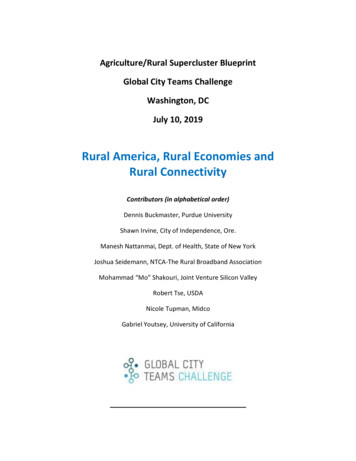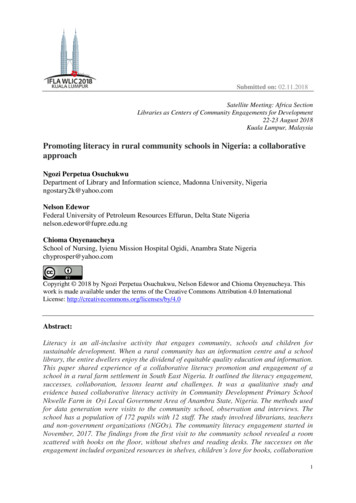
Transcription
Submitted on: 02.11.2018Satellite Meeting: Africa SectionLibraries as Centers of Community Engagements for Development22-23 August 2018Kuala Lumpur, MalaysiaPromoting literacy in rural community schools in Nigeria: a collaborativeapproachNgozi Perpetua OsuchukwuDepartment of Library and Information science, Madonna University, Nigeriangostary2k@yahoo.comNelson EdeworFederal University of Petroleum Resources Effurun, Delta State Nigerianelson.edewor@fupre.edu.ngChioma OnyenaucheyaSchool of Nursing, Iyienu Mission Hospital Ogidi, Anambra State Nigeriachyprosper@yahoo.comCopyright 2018 by Ngozi Perpetua Osuchukwu, Nelson Edewor and Chioma Onyenucheya. Thiswork is made available under the terms of the Creative Commons Attribution 4.0 InternationalLicense: :Literacy is an all-inclusive activity that engages community, schools and children forsustainable development. When a rural community has an information centre and a schoollibrary, the entire dwellers enjoy the dividend of equitable quality education and information.This paper shared experience of a collaborative literacy promotion and engagement of aschool in a rural farm settlement in South East Nigeria. It outlined the literacy engagement,successes, collaboration, lessons learnt and challenges. It was a qualitative study andevidence based collaborative literacy activity in Community Development Primary SchoolNkwelle Farm in Oyi Local Government Area of Anambra State, Nigeria. The methods usedfor data generation were visits to the community school, observation and interviews. Theschool has a population of 172 pupils with 12 staff. The study involved librarians, teachersand non-government organizations (NGOs). The community literacy engagement started inNovember, 2017. The findings from the first visit to the community school revealed a roomscattered with books on the floor, without shelves and reading desks. The successes on theengagement included organized resources in shelves, children’s love for books, collaboration1
and integration of teachers. Lessons learnt were that the community school has smartchildren who are eager to learn and some of them have personal children’s novels. Thechallenges were access to the rural school and closure of the school library except duringreading hour. The results were analyzed in tables and dialogue form. The studyrecommended that Librarians should take action and strategize on implementing literacyactivities in their different regions. Good practices of community engagement on literacy willadd value to the dwellers and enhance inclusive children’s learning.Keywords: children, collaboration, literacy, school library, rural community engagementIntroductionLiteracy promotion is one of the keys that support inclusive engagement in rural communityschools as well as drive holistic community development. The presence of a school and afunctional library in any community easily announces that transformation is taking place.This is development in its entirety for all community dwellers. Supporting literacy in achild’s life builds his cognitive development and enhances reading and writing skills, whichinvariably enriches community’s growth (Christie & Roskos, 2013 and Fredericks, 2011). Itis a potential for collaboration because it creates the avenue for joint literacy activities withother groups for maximum benefits. When children are taught how to read and write, theygain more insight and interact intelligibly with people. It automatically adds value to thecommunity through informed population whose ideas and inputs improve development.Arguably, literacy today has gone beyond simple knowledge of reading and writing. It hasevolved to encompass ability to identify, connect, understand, practice, access information,create and communicate (International Literacy Association, 2018; Farmer, 2017 and Tucker,2014). This notion has enjoined librarians to take charge and transform the communities andall sectors with the creation of biggest idea store for actions (IFLA, 2018). The action planincludes the rural school children because they are the progressive population that will ensuretransformed sustainable strong communities. It translates to community development asevery community wants its children to succeed. The Rural School and Community Trust(2015) recognized the powerful influence that communities have on their children. Hence,communities usually are inspired by groups and work together to build expectations for theirchildren.In Nigeria, there are many rural communities with schools and children who have notachieved literacy to improve their lives. These communities are characterized bydevelopment issues like low level of literacy, lack of libraries and information centres, basichealth facilities, access roads and portable water (Haruna & Onyebu, 2011). The issues affectlearning processes of children. However, efforts from many librarians in collaboration withnon-government organizations have enabled the children to have access to literacy activitieswith books, learning resources and library equipments (osuchukwu, et al. 2017; iruoma, 2018and association for reproductive and family health (arfh) (2015). Clearly, collaboration helpsto promote literacy in rural schools. It bridges the gap of social exclusion for there can be notrue sustainable development without community inclusiveness. It is against this setting thatthis paper presents literacy promotion in rural community schools in Nigeria withcollaborative approach.2
Background of the rural community schoolThe Community Development Primary School Nkwelle Farm is located in the agricsettlement situated in Nkwelle Ezunaka in Oyi local government area of Anambra State,South East Nigeria. The Farm was established by the government in 1934 for agriculturalpurposes. It has blocks of residential buildings for farmers and staff which made the thengovernment to set up the school for the children of the dwellers. Over the years, parts of thefarm areas have been acquired for housing development. There are still old historic buildings.The settlement has grown to accommodate other people who moved in from the urban areas.There is no community library or information centre that engages the dwellers on long lifelearning and development. The community school has no library nor indulges in specialactivities that improve literacy. There are now private schools in the settlement butCommunity Development Primary School Nkwelle Farm remains the only governmentschool with majority of children from average parents.Objectives of the studyThe main objective of this paper is to share experiences of collaborative literacy engagementin a rural community school. Specifically, this paper highlighted the:1. Literacy engagement in the rural community school2. Successes of the literacy activity in the rural community school3. Collaborative approaches harnessed4. Lessons learnt from the literacy engagement5. Challenges on the literacy engagement6. Implication of the findingsStatement of the problemIt is often hard to believe that many communities and their schools neither have libraries norinformation centres where as some other communities and their schools are equipped withlearning facilities with good practices of literacy engagement. According to ILA (2018) it'sastonishing that in this day and age, there are still millions of people from every corner of theworld who are denied access to literacy education. Yet the same evaluation tools are used tomeasure the school children for placement in higher schools, irrespective of theirgeographical zones. This is gross social injustice as the rural school children are not exposedto the same level of literacy engagement with their counterparts in urban areas. Though, therehave been evidences of successful literacy engagements, there are still lots of communitiesand schools to be reached. This paper shared the experiences of collaborative literacyactivities in a rural community school through library engagement in South East Nigeria.Literature reviewLiteracy activities have the magic of making the children love reading and learningexperiences. Emphatically, ILA (2018) stated that literacy is essential and creates moredynamic societies, prosperous economies and meaningful lives. Participation and engagementin rural community schools is not a new concept in literacy delivery. The U.S Department ofEducation (2014) has awarded several grants to communities for schools literacy activities toenhance economically disadvantaged children develop early literacy, children’s readingability and motivate children to read. Researchers and groups have also acclaimed the goodpractices of literacy activities in communities schools through access to library, readinggroups, promoting fiction and non-fiction books, read aloud, picture books, singing, teachingof ICT and encouraging lifelong learning (IFLA Reading and Literacy Section 2018; ILA,2018; Osuchukwu, et al, 2017 and Shenton, 2011). The essence is to build communitymembers who can drive their own ideas and accomplish things they think that are impossible.3
Evidence based researches have shown that great successes are achieved through literacyprograms in the schools. The studies of Nielen & Bus (2015), Todd (2011) and Chance &Segura (2009) reported success in schools with higher standardized reading comprehensiontests, reading-to-learn competencies, personal and interpersonal competencies, achievementof adequate yearly progress. Indeed, integration of rural schools and children in literacyactivities dissipates exclusion and low level of education. Worldwide literacy continues to bea vital priority because literacy matters (Farmer, 2017). This assertion demonstrates theleverages on successful literacy activities in the community schools for more achievement ofgoals.In the rural setting, librarians, organizations and researchers have continued to collaborate instrategizing innovative activities for schools. The Rural School and Community Trust (2015)through its LIREC (Literacy Innovation in Rural Education through Collaboration) projectsin rural schools across U.S. have been collaborating to implement a multi-layered, ruralspecific approach to improving early literacy, especially for at-risk children in high-povertycommunities. In Nigeria, many schools have also benefitted from collaborative inclusiveprograms from librarians, teachers and organizations. For instance, Osuchukwu, et al (2017),Olojede, (2017) and Mohmoud, (2017) asserted that collaboration has transformed manyschools through improvement of literacy activities as well as increased access to learning. Ittransforms into multiple effects of satisfaction from all stakeholders as students are generallyfocused in the learning processes.However, challenges impinge on effective community school literacy engagement. InNigeria, the larger population that resides mostly in the rural areas suffer from isolation,distance, lack of access to information and good school facilities. Besides, literacy activitiesin the rural schools have been affected by lack of school libraries, parental involvement, lackof librarians in the rural school libraries, attitudes of some teacher who are mostly scaredfrom accepting to work in schools situated in the rural areas and supervisors unwillingness toregularly supervise such schools (Haruna & Liman, 2015 and Ofodu 2011). These factorsmilitate against literacy development among Nigeria rural children. That notwithstanding,challenges also come from collaborative exercise where some parents do not supportstudents’ actions in reading (Domínguez, et al. 2016).MethodologyThis is qualitative and evidence based study that took place in Community DevelopmentPrimary School Nkwelle Farm, Nkwelle – Ezunaka community in Oyi Local GovernmentArea of Anambra State, South East Nigeria. The methods used for data generation were visitsto the school, interviews and observation. The first visit to the school was in November 2017.Several engagement visits were made which integrated literacy activities and development ofschool library. The literacy activities took place during school hours in agreement with theschool headmistress with different programs for different classes. The school has apopulation of 172 pupils with 12 staff. The partners in the project were three Librarians, nongovernment organization, teachers and the community. The results were analyzed andpresented in tables and dialogue formats.4
ResultsObservation of the literacy activities in the rural community schoolThe very first visit in November, 2017: A classroom mapped out for a school library which was locked but opened on ourrequest Books scattered on the floor of the supposed school library No shelf A long classroom chair with writing top No chart or picture on the wallTable 1: Literacy activities in the rural community schoolS/N Existing classes Number of classesLiteracy activities1.Pre-schoolOne classReading aloudLooking at picture booksSinging2.Nursery1–3Reading aloudLooking at picture booksRhymes and singingStory tellingPicture recognition3.Junior primary1–3Group readingReading aloud by childrenComprehension passagesQuestions and answersWord building4.Senior primary 4 – 6Group readingReading aloud by childrenComprehension passagesQuestions and answersSummary of novels readVocabulary buildingFacilitatorsLibrariansLibrariansand teachersLibrariansand teachersLibrariansand teachersThe Table above shows the different literacy activities offered by the Librarians in the ruralschool. The school children were grouped according to their classes and cognitivedevelopment. The activities for the pre-school and nursery sections concentrated more onreading aloud, singing and having fun looking at pictures since many of them are stilllearning how to talk. The primary sections have more intense reading with comprehensionpassages, questions and answers, vocabulary building and reading in turns.Successes achieved in the rural school literacy Engagement Establishment of the school library with donations of shelves, learning resources, text,story and picture books Adoption of library story hour program for all classes Love of books and eager to show mastery of reading by children Teachers were supported with strategies and resources in offering wide range oflearning experiences Connection and network between the school and the NGO Connection of the rural school with the State Public Library Management Integration of teachers and community members in the school literacy activities5
During the interview, the headmistress told us that she was invited to the state capital and wasgiven books, learning charts, reading desks and chairs for her school. She stated:We put up this wall shelf as you suggested when you visited earlier so thatour books would not be scattered on the floor again.The teacher in charge of the school library stated:We chose Tuesday as our library day. When it is time I open the libraryfor reading. We have two groups – nursery and primary sections.They come at different times and spend about 30 minutes each to look at picturebooks and read from the charts. Their teachers come with them to maintain orderTable 2: Collaborative activities in the rural schoolS/N Types of resourcesProviders1.Donation of children’s books and chartsLibrarians and NGO2.Donation of shelvesNGO3.Literacy activitiesLibrarians and teachers4.Refreshment for the childrenLibrarians and NGO5.Exercise books and writing materialsNGOThe Table shows the aspects of contributions by partners in making the literacy activitysuccessful. While the Librarians and the teachers took charge of reading and learning, theNGO donated the shelves and writing materials. Donation of children’s books and lightrefreshments were done by the Librarians and the NGO. It was a mutual respectfulcollaboration that suited the partners.Lessons learnt from the literacy engagement The rural community school has smart children who are eager to learn During the study, the researchers found out that the headmistress and the teachers inthe rural community school love reading and enjoy the literacy activities. Thisenthusiasm was transferred to the children who also looked forward to the activity. Some children in the primary section have children’s novels and read them The community members also want their children to acquire the same equitablequality education like other schools in the cities The school has not organized any activities that drew parents to witness theirchildren’s achievement in reading and learningChallenges on the literacy activity The library is always closed except on visitation and on Tuesdays during the libraryhours There is no teacher or staff permanently stationed in the rural school library forregular reading hour Access to the rural school, especially in the rainy season was very difficult The children are not allowed to borrow books.The reason according to headmistress and the teacher during the interview was that:The children will tear or lose the books. So we do not allow them to go homewith the books. They only use the books during the library period6
Discussion of findingsThe state of the rural community school library at the first visit was very embarrassing whichcreated the resolve to adopt the school and take actions in transforming it. The results of thetransformation with the literacy activities simply showed that Librarians can championcommunity development by taking action and creating opportunities that foster love ofreading. The indication is that the kind of play activities in the preschool and nursery classeshas the potential to engage them with meaningful context for essential early literacy conceptsand skills (Christie & Roskos, 2013).The successful literacy engagement recorded in the rural school signified that childrenanywhere can learn and love reading if given opportunities. This buttresses the studies ofNielen & Bus (2015) and Todd (2011) that reading comprehension, reading-to-learncompetencies, personal and interpersonal competencies can be achieved in school literacyactivities. Also, the successful creation of school library and the joy of creating library hourssignified a milestone in rural school engagement. In view of this, strong and united libraryprograms can curb social exclusion in reading and create informed and participative youngpeople.The realization that collaboration works implies that planning and implementing jointactivities can create formidable team for achievement of goals. The donation of reading andlibrary resources (Table 2) with real literacy classes with different groups made the projecteasier. This synchronized with collaborative activities which Osuchukwu, et al (2017),Olojede, (2017) and Mohmoud, (2017) stated as capable of transforming many schoolsthrough improvement of literacy activities as well as strategies that increase access tolearning aid. The Rural School and Community Trust (2015) also described it as uniqueaspect that benefits everyone, especially children.Certainly, the challenges of inadequacy of library resources, inaccessibility of school libraryamong others are issues of concern. This definitely affects literacy development and coulddampen a fertile mind of a growing avid reader. This is one good area that needs continuousdiscussion to ensure regular use of library. That notwithstanding, the lessons learnt from theactivity are reflection of hunger for reading and learning by the disadvantaged group. Schoolis a part of community that contributes to its growth. Hence, every avenue should be used tomake rural school libraries function effectively.Implications of the studyLiteracy is vital in creating assertive minds and empowering community. If the schools andthe children are parts of the acknowledged community, then they should be engaged andserved with library resources. Children in rural communities cannot be allowed to degenerateinto illiterate populations like some of the older dwellers who could not attain basiceducation. The insinuation is that if librarians do not leave the city to engage the ruralcommunities, the rural schools without libraries will continue to function with only one wingwhich does not fit into global sustainable development goal 4 - equitable quality education. Itcould also be likened as a social injustice where only children in the cities are served withlibrary services while the rural children continue to be segregated and marginalized. Thus,librarians must step up and take action. Literacy cannot be allowed to wobble on indifferenceattitudes of some stakeholders. The African communities and their children must be made todevelop and shine forth like others. It has been shown that there are many sharp, intelligentrural children waiting to exhale. Africa and the world need their inputs. Thus, if Librariansconveniently forget the rural schools, communities and their children, Africa will always be7
in the dark with that strong description – dark Africa. Now is the time to engage and bringour rural school children to the light. Librarians in the Africa must not go contrary to theglobal literacy trend and IFLA’s guidelines in taking action, everywhere, anytime.ConclusionEvery school and community is a pride of the dwellers. Literacy is one of the critical toolsthat can transform our community, increase its value and develop without measure. It takes afunctional library or information centre to offer best practices of long lasting developmentopportunities. These opportunities can start from the school library with well strategizedcollaboration from effective organization. Hence, this study concludes that literacyengagement in community schools must be supported at all times for the development ofschool children and the community. Collaboration must be sought for greater impacts whilechallenges must not deter Librarians from contributing to building strong cities andcommunity through literacy engagement. Nothing beats community engagement even in theschool sector. So let us all get involved.RecommendationsBased on the study, the following recommendations are made:1. Librarians should take action and strategize on implementing literacy activities intheir different regions. This will make things happen in the rural community2. Transformation of rural community schools should be given adequate priority by allstakeholders.3. Collaboration and partnership must be sought by libraries and librarians.4. Innovative practices on literacy can be used to catch them young and strategize oncommunity engagement for common good.ReferencesAssociation for Reproductive and Family Health (ARFH) (2015). Improving access toquality education in rural communities in Northern Nigeria. Assessed on May 25,2018 from ce, P. L. & Segura, S. N. (2009). A rural high school’s collaborative approach to schoolimprovement. Journal of Research in Rural Education, 24(5): 1-12Christie, J. F. & Roskos, K. A. (2013). Play’s potential in early literacy development. InTremblay, R. E., Boivin, M. Peters, RDeV (eds.) Smith PK. Encyclopedia on EarlyChildhood Development. Assessed on May 30, 2018 from mínguez, .N., García, I., Martinó, J. & Méndez, A. (2016). The school librarian asmotivational agent and strategist for reading appreciation. Journal of Librarianship andInformation Science, 48(3): 236-246.Farmer, L. (2017). Literacy matters! Using research to promote literacy and reading inLibraries (Updated edition). Assessed on May 27, 2018 fromhttps://www.ifla.org/files/assets/literacy-and reading/publications/ifla research literacy8
Fredericks, A. D. (2011). Building literacy bridges with readers theatre. School LibraryMonthly 27(4): 42-44.Haruna, B. M. & Liman, B. M. (2015). Challenges facing educating Nigerian child in ruralareas: Implications for national development. In Proceeding of the 3rd Global Summit onEducation, Organized by WorldConferences.net on March 9-10 in Kuala Lumpur, Malaysia(e-ISBN 978-967-0792-01-1), pp. 262-270Haruna, M. J. & Onyebu, G. N. (2011). Challenges of child education in the Nigerian ruralareas: Implication for national development. Farfaru Journal of Multi-Disciplinary Studies.Vol. 6:178-183.IFLA Reading and Literacy Section. (2018). About the literacy and reading section. Assessedon May 30, 2018 from https://www.ifla.org/activities-and-groupsIFLA. (2018). 2018 IFLA Global vision regional workshop: Asia Oceania. Assessed on May25, 2018 from https://www.ifla.org/node/36484International Literacy Association (ILA) (2018). Join ILA to help your students—and to helpus advance literacy! Assessed on June 2, 2018 ational Literacy Association (ILA) (2018). Why literacy. Assessed on May 30, 2018from eracy lessons learnt from theliteracy activityIruoma, K. (2018). NGO donates educational materials to rural community school in Enugu.Assessed on May 25, 2018 from hmoud, Y. (2017). Improving Nigerian education: reading and numeracy activity.Assessed May, 30, 2018 from racyactivity/Nielen, T. & Bus, A. (2015). Enriched school libraries: A boost to academic achievement.AERA Open, 1(4): 1-11.Ofodu, G. O. (2011). Relative effects of school location, class levels and gender on readingneeds of secondary school students in Nigeria. An International Multidisciplinary Journal,Ethiopia Vol. 5 (6): 36-42. Serial Number 23Olojede, (2017). Achieving the international benchmarks for adult literacy in Nigeria : Post2015 challenges and prospects. European Scientific Journal. Vol.13 (34):392-413Osuchukwu, N. P.; Okonkwo I. N.; Obuezie, A. C. and Udeze, N. S (2017). Pathway toinclusive community children reading program for sustainable development: Summer readingexperience in Anambra State, Nigeria. Library Philosophy and Practice (e-journal). Assessedon May, 30 .cgi?article 4817&context libphilprac16909
Shenton, A. K. (2011). Uniting information literacy promotion and reader development inschools: Two forms of library-based intervention. IFLA Journal, 37(1): 62-68.The Rural School and Community Trust (2015). Increasing early literacy in ruralcommunities. Assessed on May, 15 2018 from http://www.ruraledu.org/articles.php?id 3256Todd, R. (2011). From literacy to inquiry: A holistic approach to literacy development inselected Australian schools. Paper presented at IFLA Congress, San Juan, Puerto Rico,August 13-18Tucker, C. (2014). The definition of literacy is changing. Assessed on May 30, 2018 n-of-literacy-is-changing/U. S. Department of Education (2014). Programs: Innovative approaches to literacy program.Assessed on June, 18 2018 from cy/2014awards.html10
Department of Library and Information science, Madonna University, Nigeria ngostary2k@yahoo.com Nelson Edewor Federal University of Petroleum Resources Effurun, Delta State Nigeria nelson.edewor@fupre.edu.ng Chioma Onyenaucheya School of Nursing, Iyienu Mission Hospital Ogidi, Anambra State Nigeria chyprosper@yahoo.com
